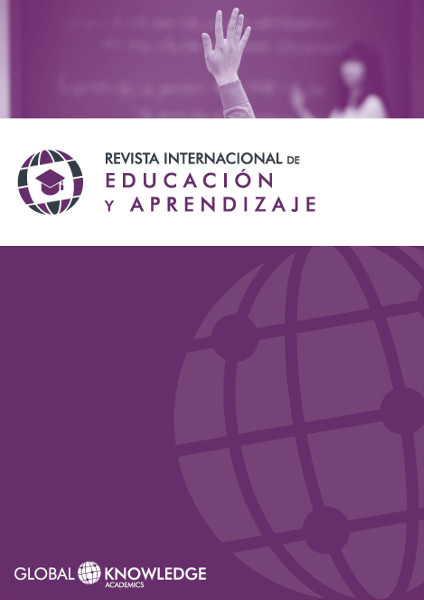Innovation in methodology, tutorial action and evaluation of teaching performance
DOI:
https://doi.org/10.37467/gka-revedu.v6.1730Keywords:
Research-action, Tutorial action, Teaching performance, Inclusion, Monitoring of learning, InnovationAbstract
This paper presents four coordinated and developed researches with mixed Methodology and a Research-Action process, from a Technical model. This looks for ending up in a innovation process at the Technical University of Manabí: Inclusion of students with visual functional diversity, Methodological change focused on the learning process, Elaboration of a Action Plan Tutorial for the follow-up of the learning process of the students and design of a model on evaluation of the teaching performance by competences. The true interest of these investigations is in the reflection that these provoke in diverse groups of professors involved in each one of the processes.
Downloads
Global Statistics ℹ️
|
693
Views
|
177
Downloads
|
|
870
Total
|
|
References
Bartolomé, M. (1986). La investigación cooperativa. Revista Educar (Universidad Autónoma de Barcelona). Nª 10.
Blanchard, M. (coord.) (2014). Transformando la sociedad desde las aulas. Madrid: Narcea.
Blanchard, M. y Muzás M.D. (2016). Los proyectos de aprendizaje. Un marco metodológico clave para la innovación. Madrid: Narcea.
Coll, C. Onrubia, J. y Mauri, T. (2008). El análisis de la interacción alumno-profesor: líneas de investigación. Revista de Educación, Nº 346, Mayo - agosto 2008.
Correa, J.M. y Aberásturi, E. (2013) (re)pensar la innovación en la universidad desde la indagación. San Sebastián: Edición Universidad del País Vasco.
Cullen,J. (1996). Thechallenge of Te Wharikifor future developments in carly childhood education en Delta, 48 (1) 113 - 26.
Darling-Hammond, L. (2001). El derecho de aprender. Crear buenas escuelas para todos. Barcelona: Ariel.
Dewey, J. (1938). Experience and Education. New York: Kappa Delta Pi.
Fernandez Enguita, M. (1998). Economía y sociología: Para un análisis sociológico de la realidad económica. Monografía. Enero. Centro de Investigación Sociológica.
Fullam, M. (2002). Las fuerzas del Cambio. Explorando las profundidades de la Reforma Educativa. Madrid: Editorial Akal.
Hager, P., Holland, S. & Beckett, D. (2001). Enhancing thelearning and employability of graduates: the role of genericskills, Paper. B-Hert, Melbourne, July, Nº 9.
Johnston, B. (2013). El primer año de universidad. Una experiencia positiva de transición. Madrid. Narcea.
Kemmis, S.(1988). La investigación en la acción. Barcelona. Ediciones Martínez Roca.
Kemmis, S., y McTaggart, R. (1992). Cómo planificar la investigación-acción. Barcelona: Laertes.
Lave, J. y Wenger, E. (1991). Situated Learning: Legitimate Peripheral Participacion. Cambridge: University Press. DOI: https://doi.org/10.1017/CBO9780511815355
Madrid, D. (1999). Modelos para investigar en el aula de L.E. en Salaberri, S. (Ed.) Linguistica aplicada a la enseñanza de lenguas extranjeras. Universidad de Almería: Secretariado de Publicaciones, pp. 126-181.
Universidad Técnica de Manabí (2015). Modelo educativo UTM.
Mossuto, M. (2009). Problem-based learning: Student engagement, learning and contextualised problema-solving. Adelaide:NCVER extraído de www.ncver.edu.au/publications/2198.html.
Murillo, F. J., Krichesky, G., Castro, A. y Hernández, R. (2010). Liderazgo para la Inclusión y la Justicia Social. Revista Latinoamericana de Educación Inclusiva, 5 (1).
Parrilla, A. (2002). Acerca del origen y sentido de la educación inclusiva. Revista de Educación, n.327 (2002), p.11-29.
Perrenoud, P. (2012). Cuando la escuela pretende preparar para la vida. ¿Desarrollar competencias o enseñar otros saberes?. Barcelona: Graó.
Plan de mejora de la UTM, 2016.
Poblete, M. (2006).Las competencias, instrumento para un cambio de paradigma. Huesca: X Simposio de la SEIEM.
Proyecto Tuning (2007).Proyecto Tuning para América Latina, El Caribe y Unión Europea (ALCUE ó UECAL).
Rodríguez Marcos et al. (2011). Coaching reflexivo entre iguales en el Practicum de la formación de maestros. Revista de Educación, nº 355, mayo-agosto, pp. 355-380.
Rodriguez Marcos, A. et Pessoa, T. (2014). La práctica cotidiana en los colegios. Barcelona: Octaedro.
Skiba, D., Barton, A., (2006). Adapting Your Teaching to Accommodatethe Net Generation of Learners. The Online Journal of Issues in Nursing, Vol.11 - Nº 2 May. DOI: https://doi.org/10.3912/OJIN.Vol11No02Man04
Zabala, A. (2012).La organización social del aula, clave para las competencias para la vida educativa. Revista Aula de innovación, nº 2015 octubre 2012, Barcelona, pp. 16-17.
Zabalza, M.A. (2009). Ser profesor universitario hoy. La cuestión universitaria, 5, 2009, pp. 69-81. Madrid.
Downloads
Published
How to Cite
Issue
Section
License
Those authors who publish in this journal accept the following terms:
-
Authors retain copyright.
-
Authors transfer to the journal the right of first publication. The journal also owns the publishing rights.
-
All published contents are governed by an Attribution-NoDerivatives 4.0 International License.
Access the informative version and legal text of the license. By virtue of this, third parties are allowed to use what is published as long as they mention the authorship of the work and the first publication in this journal. If you transform the material, you may not distribute the modified work. -
Authors may make other independent and additional contractual arrangements for non-exclusive distribution of the version of the article published in this journal (e.g., inclusion in an institutional repository or publication in a book) as long as they clearly indicate that the work was first published in this journal.
- Authors are allowed and recommended to publish their work on the Internet (for example on institutional and personal websites), following the publication of, and referencing the journal, as this could lead to constructive exchanges and a more extensive and quick circulation of published works (see The Effect of Open Access).













